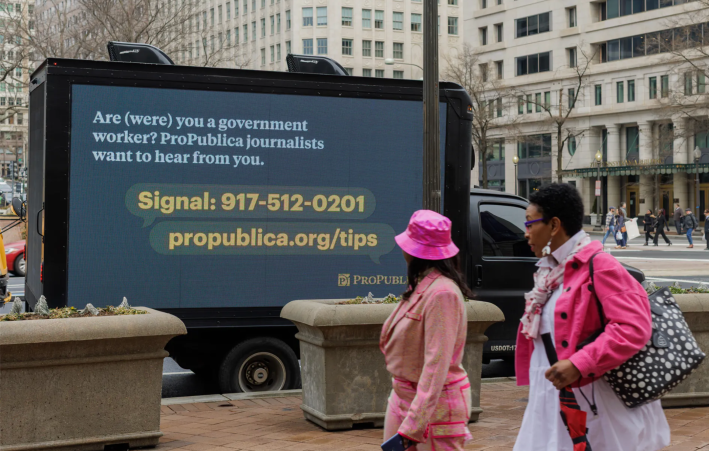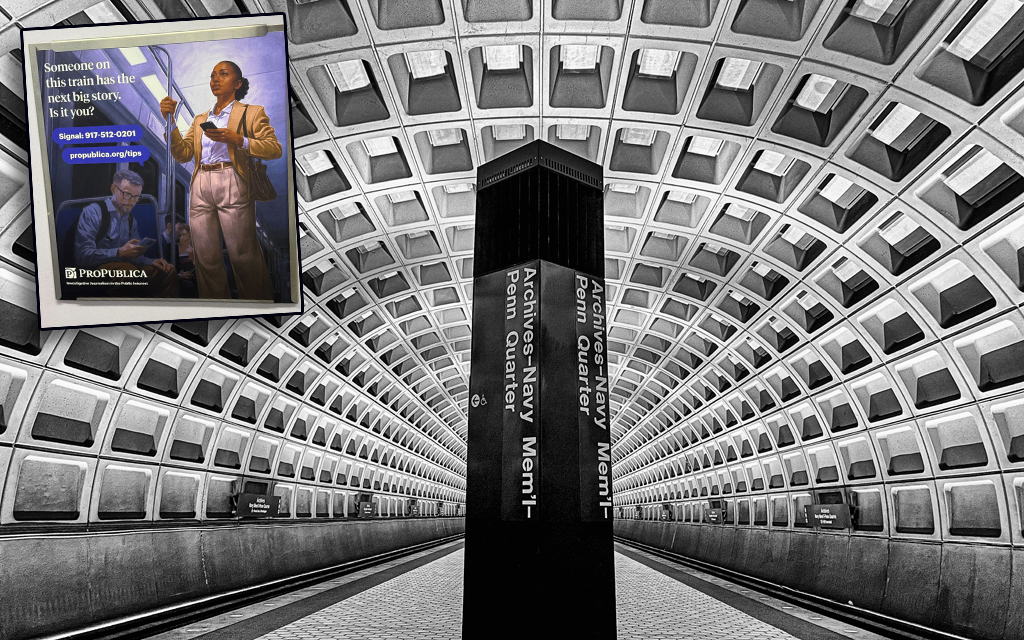One of America's top investigative newsrooms wants to uncover news stories about the federal government by appealing to potential tipsters on public transit — and highlighting the importance of shared modes for reinforcing the pillars of democracy.
ProPublica recently launched a new ad campaign on Washington Metro encouraging District residents to leak "the next big story" to the non-profit site's journalists via the anonymous, encrypted Signal app. (For the record: Streetsblog has a Signal tip line, too, in addition to our open tip line for sources who are willing to go on the record.)
Spotted on the DC Metro today! @propublica.org
— Alison Fitzgerald Kodjak (@alikodjak.bsky.social) 2025-09-23T19:36:39.843Z
By targeting routes frequented by federal workers, the campaign aims to get people inside the Trump administration to help illuminate important stories the public doesn't get to see — a task that ProPublica says has become exponentially harder since the White House changed hands.
In the last eight mouth, the Trump administration has revoked press access to outlets that report information without government approval even if it's unclassified, denied comment to journalists who include their preferred pronouns in their email signatures, and even hand-picked the reporters allowed into — and barred from — the White House press pool, breaking with long-established precedent.
Meanwhile, even journalists who are allowed access to the federal government have faced steep new barriers, like delayed Freedom of Information Act requests on which reporters rely to do their jobs – not to mention the unusually chaotic rhythms of the Trump administration itself, which is notorious for "flooding the zone" with multiple incendiary stories in a single day, to quote adviser Steve Bannon of media relations.
"People are our fuel for some of the most important stories that aren't being put out in press releases," said Maryam Jameel, engagement reporter for the outlet. "And also, things are moving so quickly; I think that's something that's quite unique."
ProPublica's unconventional campaign actually didn't begin on D.C. trains – though Jameel says she and her colleagues are getting some of their most valuable tips from below ground now.
The team initially piloted the concept with a "tips truck" in late February, when the U.S. Agency For International Development was dismantled by the Department of Government Efficiency. ProPublica parked that truck directly outside the USAID offices on the day most employees were directed to clean out their desks, an inexpensive and temporary way to test its new "guerrilla marketing" style of sourcing tips.

As it became more clear that the Trump administration wasn't going to soften its attitudes toward the press, the outlet decided to take the leap and pay for ads where they would have the most impact: on shared modes. Before the pandemic upended D.C. commutes, about 40 percent of riders on District buses and trains were federal workers; when return-to-work orders came down in February for government employees, Metro ridership reached a five-year high.
"The tips truck was a much lower lift, both cost-wise and logistics-wise," added Jameel. "And so [it] turned out to be a nice test for us — and that, I think, encouraged us to pull the trigger on going forward with these ads which are more expensive, and take more planning and art design."
Jameel is staying tight-lipped about exactly what kinds of tips her colleagues are getting from District trains, but she says the response has been significant — and she's not surprised.
Contrary to some right-wing attempts to paint shared modes as violent hellscapes, the relaxed environment of a train car gives passengers an ideal atmosphere to fire off a discrete Signal message with a tip about what they've observed during their workday — without the threat of killing someone while texting behind the wheel of a car. And because ProPublica is allowing tipsters to start these conversations anonymously and verifying their accounts later, they can do so without fear of getting fired by an administration that's prided itself on axing hundreds of thousands of federal workers.
"The reality of people losing their jobs is very, very high," added Jameel. "People have mouths to feed. People have very real financial needs. ... Even a slight suggestion of being disloyal could lead to job loss or other severe repercussions."
Meanwhile, Jameel says the public transit environment itself might motivate tipsters to speak out about what they've witnessed within the walls of Washington's most powerful offices — by simply looking around at all their fellow passengers and neighbors, who have so much to lose if government abuses are allowed to escalate unchecked.
"[On transit], you don't know who's sitting next to you; all kinds of folks are coming together in this system," added Jameel. "And I hope our journalism can be [that] accessible to folks. It's definitely something that is very much not possible without the combined contributions of our society, of the people who work for federal agencies. ... I hope that our presence on public transit will allow more folks to participate in journalism, and in these stories, at this important time."






